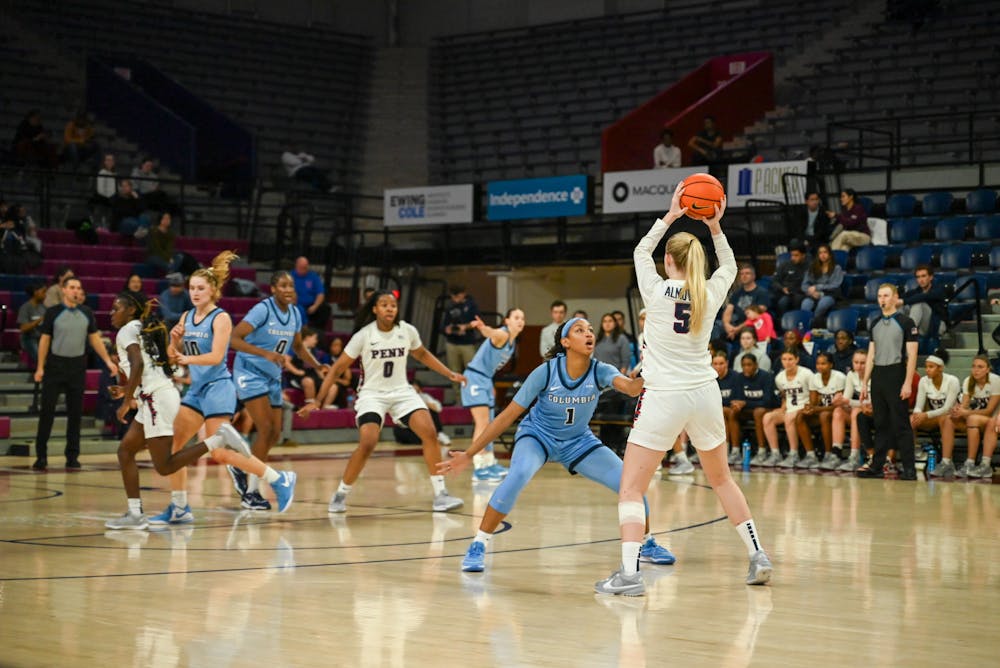
This past Saturday, Penn women’s basketball matched up against Columbia, who finished second in the Ivy League last season. Things were off to a rough start, and the Quakers struggled to put points on the board against a physical Columbia defense. In the second and third quarters, the teams seemed pretty well matched as the Red and Blue climbed back, but things fell apart toward the end of the third quarter. Sloppy play and poor rebounding throughout led the Quakers to a 74-59 loss.
While Columbia is a strong team, it is certainly not the most ominous matchup that the Quakers will have to face in the Ivy League. Harvard is currently on a 10-game win streak, most recently defeating Yale 61-43. Penn and Harvard had only overlapped on one opponent before the start of Ivy League play (Maine), whom Penn beat 56-52 and Harvard beat 83-41. Similarly, Princeton and Penn only share one overlapping opponent (Villanova), to whom Penn lost 80-64 — but Princeton beat 70-61.
These stats show that there are several intimidating in-league opponents yet to be faced. The Quakers will continue to struggle if they don’t learn from this game by making some necessary adjustments. Their game against Columbia signals several things in regards to what is next for this team and what the Red and Blue need to change moving forward.
The Quakers’ stars need more backup to pick up the slack when they are locked down defensively or having trouble getting shots up.
One of the biggest issues that came up for the Quakers during their Columbia game was that some of their usual stars did not seem to be performing at the top of their abilities.
Senior guard Stina Almqvist snapped her 20-game streak of double-digit scoring — notching only nine points against Columbia — and other usual scorers seemed to struggle throughout the game to get points on the board. Freshman guard Sarah Miller, usually sharp from the three, shot poorly — with sophomore guard Mataya Gayle also struggling to find her groove outside of a scoring burst between the second and third quarters.
This is probably because Columbia came in prepared to focus on stopping these players from dominating offensively. The impact that this strategy had points to an issue larger than star players not being able to score: The team wasn’t as ready as it should have been to pick up that slack. While the team couldn’t fully compensate, as it did end up losing the game, there was definitely some promising effort from the supporting cast.
Junior guard Simone Sawyer stepped up to lead the team in scoring with 14 points — with 12 of those 14 points coming on much needed three-pointers.
“My teammates did a really good job of moving the ball and getting me open shots and just moving around the court,” Sawyer said when discussing the impact of her three-pointers on the Columbia game. “And that’s something we work a lot on.”
So, if the Quakers can continue to tighten up their backup plans for when plays involving their go-to scorers don’t pan out, they will be better prepared to put up a fight against other Ivy League powerhouse teams.
If the Quakers can’t stop getting outrebounded, they will struggle.
In all of Penn’s losses this season, the team was outrebounded by their opponent, and in many of its biggest losses the margin was pretty large. In the game against Columbia, Penn was outrebounded by 11 rebounds; against Villanova, Penn was outrebounded by nine rebounds; and against Saint Joseph’s, Penn was outrebounded by 12 rebounds.
Obviously, part of the reason why the Quakers struggled to rebound in these games is that their opponents were all fairly strong teams, but what this information does tell us is that the potential road to success for the Quakers could be a larger focus on team rebounding.
“I think the game started off pretty strong rebounding on defense,” freshman forward Katie Collins said when asked about the team’s rebounding issue. “But I think the game kind of got away from us when we let them get offensive rebounds, and we stopped crashing on offense.”
With a greater focus on stopping teams from putting up several shots in a play, the Quakers will be better prepared to take on the rest of the league and maintain the control they seem to have had in the middle of the Columbia game.
When the Quakers get into a grove, they are a force to be reckoned with.
While there are certainly negative takeaways from this game, that is not all there is to be learned. Despite a tough first quarter, the Quakers performed well in the second frame — with Gayle going on a five-point streak to steal a one-point lead heading into halftime.
“So, I thought they got going and just got comfortable,” Columbia’s coach Megan Griffith said about Penn’s second-quarter scoring run.
When Penn gets into these comfortable groves, it is tough to stop. This is certainly promising in terms of the team’s ability to fight back against strong teams, but it is also concerning how it was unable to hold this burst of intensity out for the entire game. Going forward, if it is able to start and finish games with this energy, it will be much more capable of competing within its conference.
While this loss was certainly disappointing, it has the potential to point the team towards some improvement areas that (if focused on) could lead it toward better outcomes in the rest of the season. Luckily, the team has had a week off in between its Columbia loss and its upcoming game against Dartmouth to work out these issues.
The Daily Pennsylvanian is an independent, student-run newspaper. Please consider making a donation to support the coverage that shapes the University. Your generosity ensures a future of strong journalism at Penn.
Donate






